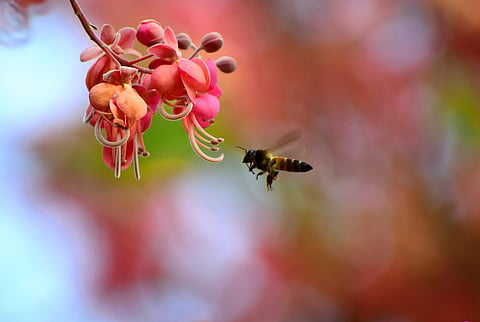

TENKASI: With the Ukraine war disrupting the sunflower oil supply, South Tamil Nadu’s farmers have chanced upon an opportunity to meet the demand. To make the most of it, farmers from Sambavar Vadakarai in the Tenkasi district are pollinating crops manually.
“This is because we haven’t had enough bees for natural pollination in recent years,” explains Sheik Mohideen, deputy agricultural officer of Shengottai block. Scientists have flagged the decline in bee populations across the world for some years, citing pesticide use and climate change as causes. Besides, manual (hand) pollination yields better-quality seeds, say farmers.
“I have been cultivating sunflower on four acres for the past eight years. Most of the time, the yield was poor. We informed agricultural officials, and they introduced us to hand pollination,” says K Sivanan, a farmer. But the task is labour intensive and requires help from not just farmers’ families, but also daily wage labourers.
This is why it isn’t practised in Thoothukudi district though officials are trying to promote it, K Navaneethan, president of Southern Dryland Farmers Association, points out, adding that most people prefer to work under MGNREGA.
As for why bees are disappearing from farms, bee scientist K Suresh says it’s mainly due to the indiscriminate use of pesticides on crops. “This is why farmers are advised to use insecticides like imidacloprid, which doesn’t affect bees as much. But recent research shows even imidacloprid affects bees, adds Suresh, who works at the Horticulture College and Research Institute in Periyakulam.
‘TN bee population down due to use of pesticides’
“Hand pollination wouldn’t be needed if farmers opt for eco-friendly crop protection using light traps, pheromone traps, a botanical insecticide, and bio-control agents, which would increase the number of honeybee colonies,” he adds.
Earlier, on rainy days in Kanniyakumari, about 5,000 beekeepers from the district used to visit Tirunelveli, Thoothukudi, and Tenkasi districts to place bee boxes in farms and extract honey, recalls P Henry, a Marthandam-based beekeeping trainer. “But in recent years, not even 100 of us have been leaving Kanniyakumari as our bees were dying. In 2019, I placed 300 boxes in the cotton fields of Thanjavur, but pesticides killed so many bees that I left all the boxes there and returned to Marthandam empty-handed. I also lost 100 boxes in Tirunelveli’s Kalakkad.”
MR Srinivasan, an entomologist from the Tamil Nadu Agricultural University, Coimbatore, says India doesn’t have any data on bee populations. “Bees are dying due to use of pesticides, urbanisation, habitat loss, and diseases. Farmers shouldn’t spray chemicals during the flowering phase when pollinators do their job.”
Full story on www.newindianexpress.com